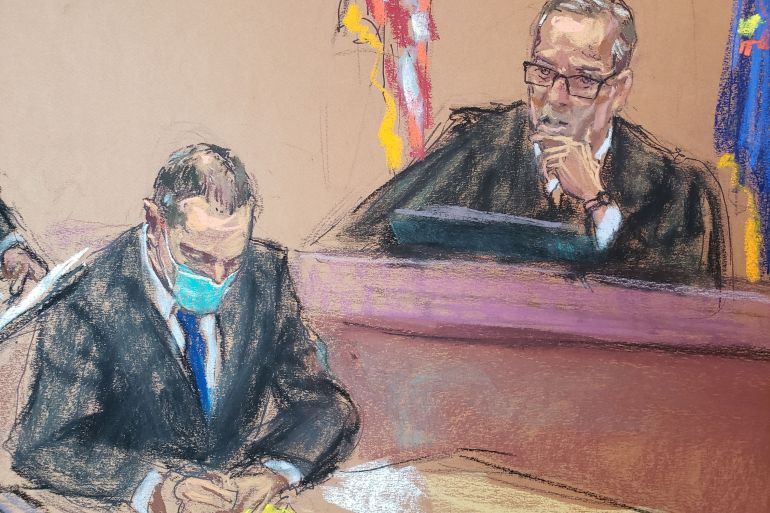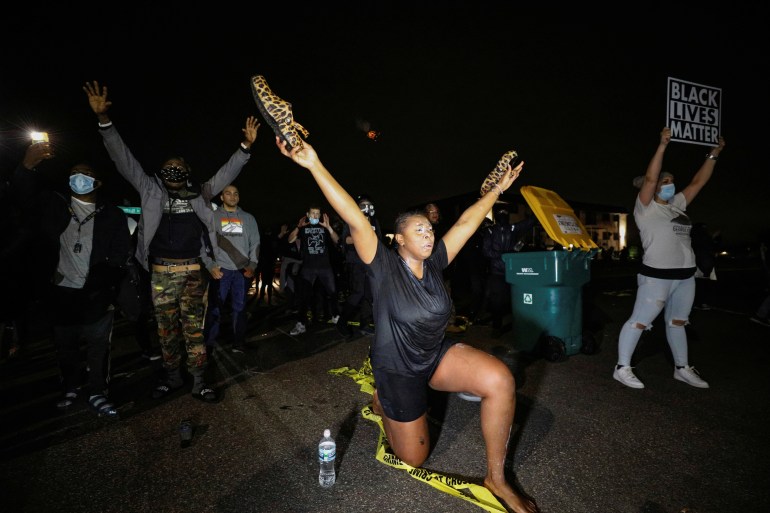Chauvin judge refuses jury sequester as Minneapolis faces unrest
Judge Peter Cahill refuses defence request the morning after the death of Daunte Wright causes renewed unrest in the United States.

The judge in the George Floyd murder case refused a defence request to immediately sequester the jury Monday, the morning after the killing of a Black man during a traffic stop triggered unrest in a suburb just outside Minneapolis in the United States.
The request came from the attorney for former Minneapolis police Officer Derek Chauvin, charged with murder and manslaughter in Floyd’s May 25 death. Defence attorney Eric Nelson argued that the jurors could be influenced by the prospect of what might happen as a result of their verdict.
Keep reading
list of 3 itemsProtests erupt after US police shoot young Black man
‘I just shot him’: Police say Daunte Wright shooting ‘accidental’
“Ultimately, your honour, the question becomes will the jury be competent to make a decision regardless of the potential outcome of their decision,” Nelson said.
Judge Peter Cahill seemed unconvinced and said he will not sequester the jury until next Monday, when he anticipates closing arguments will begin. He also denied a defence request to question jurors about what they might have seen about unrest following Sunday’s police shooting of 20-year-old Daunte Wright in Brooklyn Center.
In the wake of the shooting, hundreds of protesters broke into about 20 businesses at a shopping centre, jumped on police cars and hurled rocks and other objects at police in Brooklyn Center. Officers in riot gear fired gas and flash-bang grenades.

Prosecutor Steve Schleicher argued against sequestering the Floyd jury, saying: “I don’t think that would be an effective remedy.” He also opposed questioning the jurors.
The judge had previously asked jurors to avoid news during the trial.
The ruling came as the trial entered its third week, with the prosecution close to wrapping up its case and giving way to the start of the defence. Prosecutors built their case on searing witness accounts, experts condemning Chauvin’s use of a neck restraint, and medical authorities attributing Floyd’s death to a lack of oxygen.
When testimony resumed Monday morning, Dr Jonathan Rich, a cardiology expert from Northwestern Memorial Hospital in Chicago, echoed earlier experts in saying that Floyd died of low oxygen levels from the way he was held down by police.
Corroborating other experts’ testimony, Rich said that Floyd was “restrained in a life-threatening manner”, noting among other things that he was facedown on the ground, a knee was on his neck, his hands were cuffed behind his back and being pushed upward, and a knee was on the lower half of his body.
He rejected defence theories that Floyd died of a drug overdose or a heart condition.
“It was the truly the prone restraint and positional restraints that led to his asphyxiation,” the expert said.
In fact, he said, “Every indicator is that Mr Floyd had actually an exceptionally strong heart.”
Chauvin’s attorney is expected to call his own medical experts to make the case that it was not Chauvin’s knee that killed Floyd. The defence has not said whether Chauvin will testify.